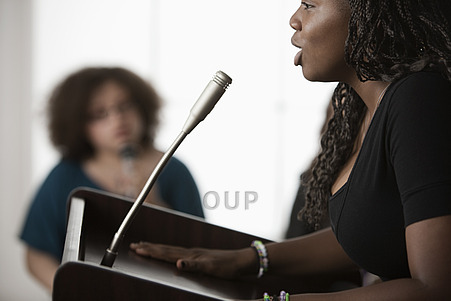 Ahead of the ELT Journal debate at IATEFL Liverpool, Graham Hall, editor of ELT Journal, presents his arguments for and against the need for published course materials.
Ahead of the ELT Journal debate at IATEFL Liverpool, Graham Hall, editor of ELT Journal, presents his arguments for and against the need for published course materials.
Teaching and learning materials of one form or another are almost, but not quite, universal in ELT classrooms. And, obviously, the materials available to teachers and learners vary widely according to context; teachers and learners may also use similar materials in different ways depending on, for example, their beliefs, knowledge and skills, and wider social and institutional expectations.
But over time, changing ideas about language learning combined with developments in technology lead to changes in ELT materials. ‘Older’ materials are often replaced by newer resources which, in turn, eventually become outdated or unfashionable. So it can help us as teachers to think through some of the debates surrounding teaching and learning materials to make up our own minds about their strengths and weaknesses.
By way of example, let’s look at some of the debates surrounding textbooks (and here I mean textbooks generally, rather than evaluating a particular book or series). Textbooks are the main source of teaching ideas and materials for many teachers around the world; indeed, it’s almost impossible to imagine ELT without textbooks. But whether they are a help or hindrance to teaching and learning is often a source of heated discussion.
Well-designed textbooks have a number obvious benefits for teachers and learners. They provide language input for learners; they can provide interesting and motivating material, organised in an appealing and logical manner; and they provide a written record of what has been studied, allowing for revision and continued study beyond the classroom. Textbooks also reduce the amount of time teachers’ require for preparation. So, one way of thinking about textbooks is that professional materials writers and teachers have different areas of expertise which complement each other. Using well-presented, professionally published textbooks frees teachers to deal with the day-to-day business of actually teaching.
But there are a number of criticisms of textbooks. Perhaps they create a ‘dependency culture’ in which teachers avoid responsibility and just do ‘what they are told’ by the textbook writers. As a result (so the argument goes), teachers may become ‘de-skilled’, losing their ability to think critically and work independently in the classroom. Textbooks are also said to fail to cater for individual needs, lead to material- rather than person-centred classes, and constrain creativity in the classroom.
However, criticisms of textbooks extend beyond these classroom-focused concerns. As well as being an teaching resource, textbooks are commercial products, which, it is claimed, are innately conservative in order to sell as widely as possible. This caution might be methodological, or it might be reflected in the cultural images that textbooks present. Most textbooks, for example, continue to focus on native-speaker lives, lifestyles and language varieties, and images of successful L2 learners are absent from many ELT materials; likewise, images of poverty, disability and many other aspects of ‘real life’ are difficult to find in many textbooks. Thus, it is argued, textbooks are not ‘neutral’, but reflect a particular view of social order and particular sets of values.
Of course, it is would unfair to suggest that textbooks writers and publishers are not aware of, or concerned about, these issues; yet producing a marketable product which does not ignore global and local realities and contexts is a difficult challenge.
These issues will be discussed and debated in more detail in the ELT Journal debate, held at the IATEFL Conference in Liverpool on Thursday 11th April (17:05-18:20 UK time). There, Scott Thornbury will propose the motion ‘This house believes that published course materials don’t reflect the lives or needs of learners’; Catherine Walter will oppose the motion. For more information about the conference, and to access the debate via Liverpool online, go to https://www.iatefl.org/.
Graham Hall is editor of ELT Journal and works at Northumbria University in the UK, where he teaches on Northumbria’s MA in Applied Linguistics for TESOL and MA TESOL programmes.


And as is well known, there are NO gay people at all in the world of TEFL coursebooks. As Scott Thornbury points out, although the word “gay” is one of most frequently used words in English (it is in the top 2,000) when have you ever seen it in a coursebook or any ELT material for that matter? (See https://tinyurl.com/clzk2xs for more.)
[…] Thornbury claimed that Published course materials don’t reflect the lives or needs of learners. Surprisingly, he did not repeat what he’s been saying for years in his Dogme / Teaching […]
[…] G. 2013. “This house believes that published course materials don’t reflect the lives or needs of learners” [online], Available at […]